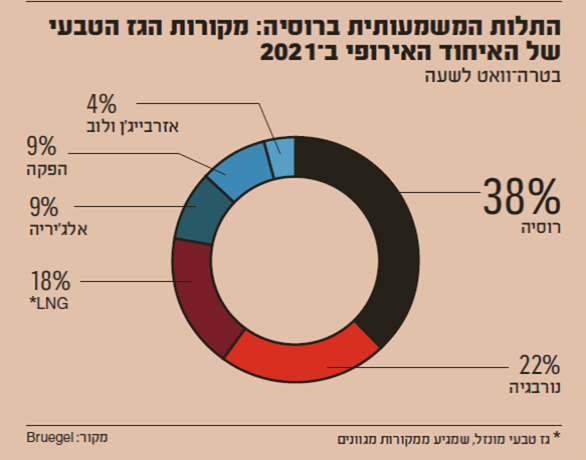Gina Cohen, a gas market expert, talks to Globes: “The Europeans have bleeding hearts/are too soft, and that is why they are now suffering from a shortage of energy about gas exports from Israel, which could give some solution to their dependence on Russian: “The US and Europe can help with LNG liquefaction technology” The Ministry of Energy has established a work team with the EU to examine a long-term gas agreement.

Gina Cohn, expert in international gas markets

Last Thursday, just a few hours after Russia announced it was stopping to send gas to Poland and Bulgaria because of their refusal to pay in roubles, Gina Cohen a world renown gas expert on international gas markets, spoke in the European Parliament in Brussels, with an emphasis on the Eastern Mediterranean region.
The sanctions imposed by Moscow is precisely what the Europeans feared with the breakout of the war in Ukraine, but is also something that represents an exceptional potential for Israel.
In her speech in Brussels, Cohen presented the various options to export gas from the Eastern Mediterranean, including Israel, instead of the Russian gas. Such a move, would first and foremost require to continue to develop the potential gas reservoirs in the Mediterranean, and to establish gas transmission infrastructure.
According to Cohen, exporting all the potential natural gas to Europe could provide Jerusalem with profits of 100 billion shekels. This is a more conservative estimate compared to that made by the Adiri 2 committee which had calculated the sum to 230 billion shekels.
Europe’s gas consumption amounts to about 500 bcm a year, out of which Russia supplied 155 bcm to the EU. From the Russian gas supply to the EU, 120 bcm was supplied to countries that support Ukraine (77%), and could well likely suffer from Russian sanctions.
Although the EU set a goal to cease buying gas from Russia by 2027, Cohen has nevertheless doubts as to whether this ambitious target can be realized and which may very well not be.
“The Europeans are reverting to using polluting coal”
According to her, as part of the battle and race to reduce their use of fossil fuel, the Europeans were overly focused on renewable energies, and failed to take care of this 30-year interim period until the 0-carbon emissions is attained. The Europeans are too soft/have bleeding heart, and that is the reason why they are now suffering from this emergency of a shortage of energy. Now precisely because of this shortage of gas, they have to revert to using polluting coal.
“This emergency situation is leading them to look for gas with the most available solution in a reasonable timeframe being liquefied gas. This, the Eastern Med, including Israel, can supply to them.” Although the USA and Qatar have increased their exports of LNG to Europe, these are nevertheless not sufficient volumes. Indeed, in Washington, the Biden Administration had put a hold on some gas fields developments.
Cohen is now calling upon the Israeli leadership to decide as soon as possible to promote the technical solutions to transmit the gas to Europe, with the objective to enable the gas companies to sign long-term gas contracts with the Europeans. Such plans would justify the development of the existing fields, as well as the continued drilling operations to discover new fields.
“There is a feeling that the Israeli leadership doesn’t understand at all the strategic importance of the gas reserves. We finally have something about which we can speak with the Europeans about, which is not linked to the Palestinian problem. Steinitz (the previous minister of Energy – D.Z.) managed to get the gas extricated from the ground, but Yechimovitch (former Labor party MK – D.Z.), with the backing of some media outlets, tried to prevent this. We now have to realize the potential and to move ahead and promote sales to Europe which is in dire need. It will be for at least 20 years, with revenues of at least $30 billion to the country”.
The expert also explained Russian’s situation: “Putin erred in his estimate of the preparedness and skillfulness of his country and also he thought he owned and had advanced technology that is suitable to develop his gas fields. The Russians did develop their own gas liquefaction technology, but it is not efficient and is not really functioning as it should. The most advanced technology is in the West, which is refusing to share it and provide it to the Russians”.
Does Israel have the technology?
“If Israel does the ‘shifting’ and sells its gas to Europe, it will benefit from the American and European technology for liquefaction”.
Within the framework of the work she carried out for the EU, Cohen recommends to set up an offshore LNG liquefaction facility that would cost about $5 billion, from which it would be possible to export about 5-7 bcm of gas a year. In her view, this is the quickest and most efficient manner in the short-term. Her next recommendation would be to construct a marine pipeline to the liquefaction facilities in Egypt.
Why are you not terribly optimistic?
“Three years ago, I wrote a report for the Ministry of Energy, and I warned them that if they don’t do something to help encourage exports – that half of the gas discovered would never be sold. And indeed, to date, they have not done anything to help realize the potential.
This current Minister even made matters worse, when she determined that no more gas exploration licenses would currently be granted. Now, we have a renewed opportunity because of the energy and gas crisis that has ensued because of the war in Europe, and the opportunity must be grasped”.
What do you recommend?
“In that report which I wrote for the Ministry of Energy, I recommended to divorce the price of gas exports from the price in the local market in israel, for tax reason and in order to encourage the companies to increase their production and to carry out new drilling activities.”
However, now the most important step to take, according to her, is to immediately adopt the recommendations of the Adiri-2 committee to increase Israel’s gas export quotas, and to even make these binding, because there is enough gas for all the Israeli needs. Her words are indeed backed by the conclusions of the Adiri-2 committee report, according to which, based on the conservative estimate of the ministry of energy, the existing and producing reservoirs have 921 bcm of gas reserves. In addition, there is an added potential to discover another 500 bcm of gas in licenses that have already been granted. In the Adiri-2 committee report, it is stated that the maximum consumption in Israel for the next 25 years will amount to 481 bcm. Namely, even if we only take into consideration the volume of gas in the developed and producing fields, it is possible to nearly double the volume of gas that is currently being exported which stands at about 10 bcm a year, flowing via the existing pipelines to Egypt and Jordan.
Cohen says that in addition to the supply to Egypt and Jordan, that Israel can export 10-25 bcm of gas a year to Europe, based on an expansion of drilling and development operations and the transmission options to Europe.
For this purpose, according to her, we have to cooperate as quickly as possible with Cyprus, inter alia, in order to develop the Aphrodite-Yishai field. The Israeli expert estimates that the gas prices will remain high for at least two to three year and this is the time frame during which Israel must act quickly.
It would appear that the government has understood this. It has become known to Globes that the Minister of Energy Karine Elharrar has reached an agreement with her Egyptian counterpart that any volume of gas that would be transmitted to Egypt beyond the volume that Israel has committed to in its gas sales agreements, would be transferred to the liquefaction facilities and from there to Europe. Moreover, after the start of the war in Ukraine – the European Commissioner for Energy Kadri Simon, has touched based with Elharrar to examine Israel’s ability to export gas to Europe. The two met at the conference for energy ministers in Paris, and the Israeli minister examined with the Europeans what would be their willingness to commit to buy gas.
The Commissioner responded that there is indeed an intention on the horizon for Europe to buy long-term supplies of gas. The sides agreed to establish joint working teams, with on the Israeli side the team to be headed by the Director General of the Ministry of Energy Lior Schillat.
However, in Israel it is estimated that it will not be possible to increase exports without production being online from the Karish-Tanin fields. One of the reason for this is heightened consumption in Israel and the preference given by the Ministry to the local market.
Only three exploration wells have been drilled since 2012
According to the Adiri-2 report, in 2012, there were 36 licenses offshore Israel and 4 leases and the expectation was that there would be further exploration and developments offshore Israel. Nevertheless, since then, only three exploration wells have been drilled, two in 2013 and one other one in 2019, whilst dozens of wells have been drilled in our neighboring countries.
In past discussions with governmental officials both in the past and in the present, the following picture comes to front: the public criticism and the pressure that was exerted in the beginning against the mere fact of drilling and then later on with the discoveries regarding taxes imposed on the gas companies and the limitations imposed on exports, have all lead to huge delays in the developments and the ability to bring in new companies into the sector and the market.
“Paradoxically, the criticism against the ‘gas monopoly’ which maybe to a large extent was justified, and the difficulties on the issues of taxation and exports, have in fact led to a change in the monopolistic status”, explained one of the senior officials. “The Abraham accords made a huge change: Chevron came here as did Mubadala from the UAE and now there is a tremendous window an opportunity, which now depends mostly on the government’s approach to become a real gas power. The Europeans will prefer to buy from us more than from any other country in the Eastern Mediterranean and the opportunity must be taken.”




 Phone:
Phone: Email:
Email: